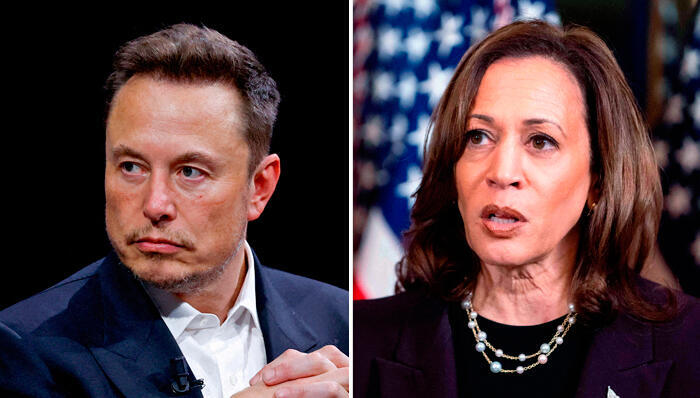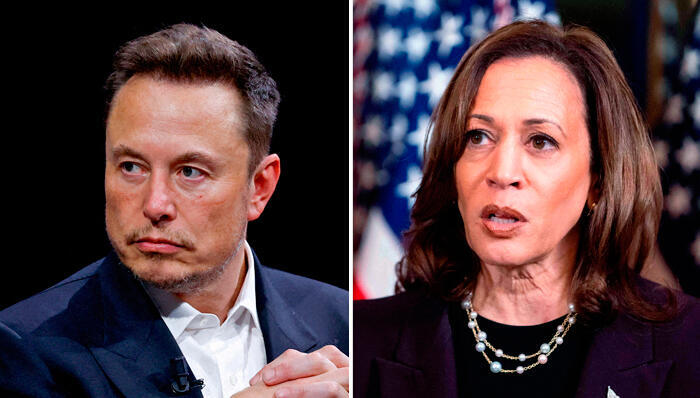
Musk vs. Harris: The social media showdown shaping the presidential race
Can a tech mogul tip the scales of democracy with a tweet?
The entry of Kamala Harris as a candidate for the presidency of the United States, stepping in for Joe Biden, has reawakened the dormant Democratic camp and injected energy into the election process. Donations began to flow, memes took over social media, and spontaneous organizations sprang up.
One of these prominent organizations is a group called "White Dudes for Harris." Last week, the group held an online fundraising event during which it managed to raise $4 million for the Harris campaign. Almost immediately after the event ended, the group received a message from X (formerly Twitter), informing them that their account had been suspended.
1 View gallery


Elon Musk (left), Kamala Harris
(Photos:: Roberto Schmidt/ AFP Reuters/Gonzalo Fuentes)
The account has since been restored, but concerns remain that Musk will use his control of X to help the Trump campaign in subtle and not-so-subtle ways. These fears have already begun to materialize: in a short time, thanks to a well-funded body he established and his control of X, Musk has become a significant force in the presidential election system. Along the way, he's also attempting to reshape the boundaries of what is allowed and what is not in election campaigns, possibly transforming X from a social media platform into a platform for electing a president.
Musk officially announced his support for Trump's presidential candidacy shortly after Trump survived an assassination attempt in July. The announcement was accompanied by reports that he would donate $45 million a month to the Trump campaign through a Super PAC (an independent body that can support a political candidate without limits on the amount of funds it raises) he founded under the name America PAC. Musk later denied these reports, claiming he was contributing at low levels.
In recent weeks, it has become clear that Musk contributes to Trump's campaign in less visible but highly significant ways, which could be worth much more than $45 million a month and could severely damage the honesty and credibility of the election process.
America PAC is currently Musk's leading agent in these efforts. According to a report by CNBC, since the beginning of July, the PAC has invested $800,000 in Facebook, Instagram, and YouTube advertisements aimed mainly at voters in swing states including Arizona, Michigan, Georgia, North Carolina, Nevada, Wisconsin, and Pennsylvania, encouraging them to register to vote.
In one of these ads, a young man is seen scrolling on his smartphone in bed when he suddenly receives a message: "Hey, you need to vote," accompanied by a video of the assassination attempt on Trump. "We've lost control. How do I begin?" he replies, and the salesperson responds: "Register to vote! It's easy!" and provides a link to the America PAC website.
All users who clicked on the link were directed to a website that promised to help them register to vote (a process that varies in each of the 50 states in the U.S.). However, depending on where they live, the website they were directed to changes. Users in states that are not considered competitive, such as New York, will be asked to enter their email address and zip code before being directed to their state's registration site. But users in competitive states are instead directed to fill out a personal details form on the America PAC website, where they are asked to enter information such as their address, mobile number, and age. After entering their information, a thank you message is displayed, but no referral is made to the actual registration page for their state. In this way, America PAC manages to collect vital personal information about citizens interested in voting, which will help them significantly as the election date approaches.
At the same time, there is concern that Musk also plans to leverage his control of X to strengthen the influence of America PAC. Already, his X account and the ads the PAC shows on social media reflect similar messages, centered on the claim that America is in the midst of a chaotic crisis and that only a vote for Trump can bring a solution.
Experts fear that Musk's control of X will allow him to turn the platform into a political weapon against Harris. "It's concerning that the owner of one of the most important social media platforms is openly supporting a candidate and using the platform as a tool to achieve political goals," Harvard University School of Government Professor Matthew Baum told CNBC.
Musk, for his part, seems determined to prove these concerns valid. Last week, Musk shared a deepfake video of Harris with his 193 million followers on X, in which an artificial intelligence voice, designed to sound like the vice president, says: "I, Kamala Harris, am your Democratic nominee for president because Joe Biden finally revealed his senility in the debate." The video also suggests that Harris was only selected because she is a minority woman and that she has no idea how to run a country—again, all in a fake voice meant to resemble Harris. The video was accompanied by a caption announcing "Harris for President" and included images and clips designed to make it look like an official election ad.
Musk posted the video with the caption "It's amazing," without mentioning that it was a deepfake—apparently in violation of X's usage rules. Only hours later, after the primary damage had been done, he claimed that the video was intended to be satirical, adding, "I checked with the recognized world authority, Prof. Suggon Deeznutz (a very crude pun), and he said that parody is legal in America." In other words: I'm not sorry, and I have no intention of stopping. Indeed, the post remains online without any clarification that it’s a deepfake and has already accumulated more than 134 million views.
Two days after the Harris video, Musk shared a conspiratorial post claiming that Google is trying to sabotage the Trump campaign by preventing autocomplete for the search term "President Donald Trump" in its search engine. This is a false claim that can be disproved within 10 seconds, as many commenters pointed out. But the post remains online, having garnered about 18.5 million views.
The U.S. elections are only three months away (November 5), and Musk is already revealing the tactics he will employ to ensure Trump's election: misleading potential voters, gathering information in deceptive ways and using it for the campaign, spreading deepfakes and lies, potentially using X to silence Harris supporters, and amplifying his and America PAC’s messages—and this is just the beginning.














